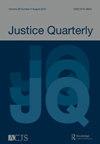Judging Hardworking Robbers and Lazy Thieves: An Experimental Test of Act- vs. Person-Centered Punitiveness and Perceived Redeemability
IF 2.1
1区 社会学
Q1 CRIMINOLOGY & PENOLOGY
引用次数: 4
Abstract
Abstract This study explores whether Americans’ punitiveness and perceptions of redeemability are shaped more by the type of crime committed or by judgements about an offender’s moral character. Guided by theories of neoliberalism, we focus on laziness as an indicator of flawed character that is independent of criminality. A sentencing vignette experiment administered to a national sample of the U.S. population tested the effects of crime type and a defendant’s employment status, work ethic, and race on respondents’ preferred punishment and perceptions of the defendant’s redeemability. Both crime type and work ethic significantly affect perceived (ir)redeemability and sentencing preferences, but the effects are not identical. Work ethic exerts the largest effect on perceived (ir)redeemability, whereas crime type most strongly influences sentencing preferences. We discuss the implications of our findings for act- vs. person-centered theories of punishment, as well as the role of laziness stigma in social responses to lawbreakers.判断勤奋的抢劫犯和懒惰的小偷:以行为与人为中心的惩罚和可救赎性的实验检验
摘要本研究探讨了美国人的惩罚性和可救赎性观念是否更多地是由犯罪类型或对罪犯道德品质的判断决定的。在新自由主义理论的指导下,我们将懒惰作为独立于犯罪的缺陷性格的指标。一项针对美国全国人口样本的量刑小插曲实验测试了犯罪类型和被告的就业状况、职业道德和种族对受访者偏好的惩罚和对被告可救赎性的看法的影响。犯罪类型和职业道德都会显著影响感知可救赎性和量刑偏好,但效果并不相同。职业道德对感知可救赎性的影响最大,而犯罪类型对量刑偏好的影响最大。我们讨论了我们的研究结果对以行为与人为中心的惩罚理论的影响,以及懒惰污名在对违法者的社会反应中的作用。
本文章由计算机程序翻译,如有差异,请以英文原文为准。
求助全文
约1分钟内获得全文
求助全文
来源期刊

Justice Quarterly
CRIMINOLOGY & PENOLOGY-
CiteScore
6.90
自引率
6.20%
发文量
44
期刊介绍:
Justice Quarterly (JQ) is an official publication of the ACJS. JQ is a refereed, multi-disciplinary journal that publishes theoretical, empirical and interpretive studies of issues related to criminal justice. JQ is indexed in Criminology and Penology Abstracts, Police Science Abstracts, Criminal Justice Periodical Index, and Criminal Justice Abstracts. In the past decade, JQ has become a premier journal and it continues to be a major forum for criminal justice related scholarship, making it an essential part of any library"s holdings.
 求助内容:
求助内容: 应助结果提醒方式:
应助结果提醒方式:


